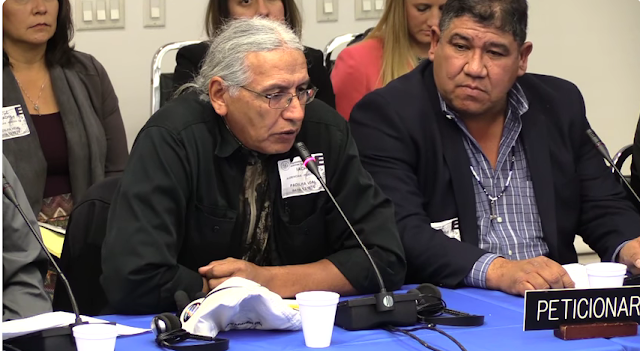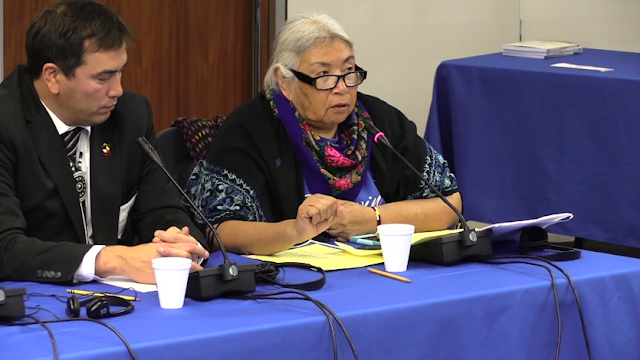 |
| Germaine Tremmel, Standing Rock, Lakota testifying from the Oceti Sakowin camp. Screenshot Censored News. |
 |
| Lakota leaders testified before the Inter-American Commission on Human Rights in December of 2016. |
"In 1968, the U.S. passed the Indian Civil Rights Act, it only protects our people from tribal governments."
He described the brutality of law enforcement at Standing Rock in 2016. "That land is our land," he said based on Treaty.
Chairman Frazier described the law enforcement blockade of Highway 1806 on federal land.
"We had a tribal member who was pulled out of a sweatlodge, arrested and charged with a felony, charged with inciting a riot, all he was doing was praying. It is one of our seven sacred rights."
"I was there on that night on the bridge, when our people were shot with rubber bullets, bean bags, tear gas, sprayed with water. I was there. I didn't see none of our people show any kind of aggression. No one tried to cross that barricade."
"The federal government will not listen to us. I thank you guys for listening."
The federal government makes decisions based on police reports from Morton County, and does not listen to Native people.
"Our people have been arrested, assaulted, tear-gassed, shot, grenades were thrown at them, but yet they stand there in defiance, for our water, we know how sacred that is. We all need water to live, good clean water, that is why we are there. Not to break laws, not to harm people, but to protect that clean water, which belongs to the Sioux people."
 |
| Steve Vance, Cheyenne River Lakota historical preservation officer in South Dakota |
Steve Vance, Cheyenne River Lakota tribal historian preservation officer, testified that his responsibility is the preservation and protection of the cultural historical properties.
 |
| Faith Spotted Eagle testifying, with Standing Rock Councilman Chad Harrison. Screenshot by Censored News. |
Faith Spotted Eagle, Yankton, said the government sacrificed the sacred and cultural sites, and failed to safeguard Indigenous rights, which has resulted in an escalation of historical trauma.
"The U.S. laws are weaponized by government officials to distort them for corporate interests and to injure particularly our women, and our children."
"We have faced this for the last 500 years," said Spotted Eagle, and chair of the Ihanktonwan Treaty Steering Committee.
Spotted Eagle pointed out that women were critically injured at Standing Rock by law enforcement. A pregnant woman was shot with rubber bullets, a rubber bullet took out of the eye of a young girl, and there was a canister that destroyed a young girl's arm.
She said this is a result of the rape culture that patriarchal systems abide by.
"The rape of Mother Earth is the rape of women."
She said women are at the heart of their culture, and called the backbone, and this trauma has been repeated over the last 500 years.
There was a child born at Oceti Sakowin, which was a major miracle in the middle of winter, born at a site of danger, and this birth gives hope to our people.
She said the tipi represents the woman and it represents the skirt. The thirteenth pole is the women's pole, and when it is put up, the tipi flows out like a skirt, a skirt that symbolizes protection of the family. The tipi belongs to the women and children.
"That is being targeted."
Spotted Eagle remembered the words of Sitting Bull, who said he worried most of all about the women and children, because he knew that these patriarchal systems would target the women.
She pointed out that the United Nations Declaration includes the right to their own cultural resources and Indigenous rights.
"We are under siege from a government that has weaponized their laws for their capitalistic interests," she said, asking for the commission's support.
"When you think about the tipi, think of the women, children and the unborn."
Chairman Frazier responded after the U.S. representative responded.
Frazier, in a heated response, said that the U.S. was failing the Lakota people, and had only called on one tribe, Standing Rock, for consultation, when it has the duty to consult all of the Lakota tribes.
"When you deal with the Missouri River -- that is all of us, the Sioux Nation."
"We are one nation."
"They don't talk to all of us, they talk to one."
He said in the job duties of the colonel of the Corps of Engineers he is supposed to interface with all Sioux tribes along the river, but he is failing."
"Where is the Department of Interior, why aren't they at this table?"
"The Interior has the responsibility to protect us and our resources."
"And yet they are the black sheep in the federal government -- because that is how they view Indian people."
Chairman Frazier said he met with President Obama and told him about the excessive force and civil rights violations. Obama said he had federal monitors there.
"I've been at that camp personally, I haven't seen any federal monitors."
He said there was no discussion with the Cheyenne River Lakota of what would be done when the pipeline breaks.
 |
| Germaine Tremmel, Standing Rock, testifying. Screenshot by Censored News |
"In the hearing “Human Rights Situation of Indigenous Persons in the Context of Projects and Extractive Industries in the United States”, the Cheyenne River Lakota, Yankton and Standing Rock Sioux tribes came to inform the Commission about the United States’ government’s failure to fulfill their obligations regarding indigenous people’s rights in the context of extractive projects.
"The representatives insisted on the excessive use of force that was deployed against peaceful protesters at Standing Rock, denouncing the use of water cannons, grenades, attack dogs, rubber bullets containing shrapnel, and highlighting three particular incidents that had terrible consequences on the physical integrity of three women.
"They also highlighted the failure of the State to consult tribal governments during the licensing process and prior to rerouting the Dakota Access Pipeline to lands adjacent to their reservations, on sites of religious significance to them, and beneath water sources such as the Mississippi river and Lake Oahe, thereby violating national statutes and applicable international standards."
"The representatives also indicated to the Commission that the State did not meet the environmental review requirements for projects that affect indigenous natural resources and had not undertaken a full environmental impact statement. The State, for its part, insisted on the fact that the Army Corps of Engineers had finally denied the access to the easement under the river, to allow for additional environmental studies and further consultation with indigenous people."
"Members of the State panel, from the Army Corps of Engineers, the Advisory Council on Historic Preservation, and the Justice Department, all acknowledged the need to improve consultation with tribal governments, to make it meaningful and timely, as well as recognized the need for a full environmental impact statement."
We also expect the hearing to be broadcast on the web: http://www.oas.org/en/iachr/default.asp
What: Hearing on the Human Rights Situation of Indigenous Persons in the Context of Projects and Extractive Industries in the United States
Who: Inter-American Commission on Human Rights, Organization of the United States
When: December 9, 2016, 10:15 to 11:15 a.m.
Councilman Chad Harrison, Standing Rock Sioux Tribe
Chairman Harold Frazier, Cheyenne River Sioux
Tribe Chairman Robert Wayne Flying Hawk, Ihanktonwan Nation (Yankton Sioux Tribe)
Faith Spotted Eagle, Yankton Sioux Tribe
The Standing Rock Sioux Tribe, the Cheyenne River Sioux Tribe and the Yankton Sioux Tribe last week petitioned the commission to call on the United States to take precautionary steps to prevent irreparable harm to the tribes, their members, and others resulting from the ongoing and imminent construction of the Dakota Access Pipeline (DAPL), and from the harassment and violence being perpetrated against people gathered in prayer and protest in opposition to DAPL.
Status Conference on the Dakota Access Lawsuit
In addition, a status conference in the lawsuit challenging the U.S. Army Corps of Engineers permitting decisions will also be held Friday morning. That hearing will discuss the next steps in the U.S. District Court litigation, especially in light of the Corps' decision announced Sunday to refuse to grant an easement for the pipeline to go under the Missouri River near the Standing Rock Sioux reservation and to study alternate routes for the pipeline. While the status conference should result in some clarity about how the litigation will unfold, it is likely to be a routine hearing with no decisions announced."
Tribes Ask International Human Rights Commission to Stop Violence Against Water Protectors at Standing Rock
Tribal representatives testifying:
Chairman Harold Frazier, Cheyenne River Sioux Tribe
Faith Spotted Eagle, Yankton Sioux Tribe
Chairman Robert Wayne Flying Hawk, Ihanktonwan Nation (Yankton Sioux Tribe)
In a case now before the federal court -- Marcus Mitchell, Dine' (Navajo) was shot in his eye by a shotgun fired by law enforcement at Standing Rock in the early hours of January 18, 2017, at Backwater Bridge. After he was shot, militarized law enforcement threw him on the ground and he felt like he was drowning in his own blood. After waking from surgery, he had to endure questioning by law enforcement in the hospital.





1 comment:
Blackfoot-Cree Nation member, in Missoula, MT. Would very much like to know the OUTCOME OF International Humane Rights Commission violation at Dakota Access Pipeline. Interested in OFFICIAL findings, actions concerning violations. Respectfully, R.M. Villa.
Post a Comment